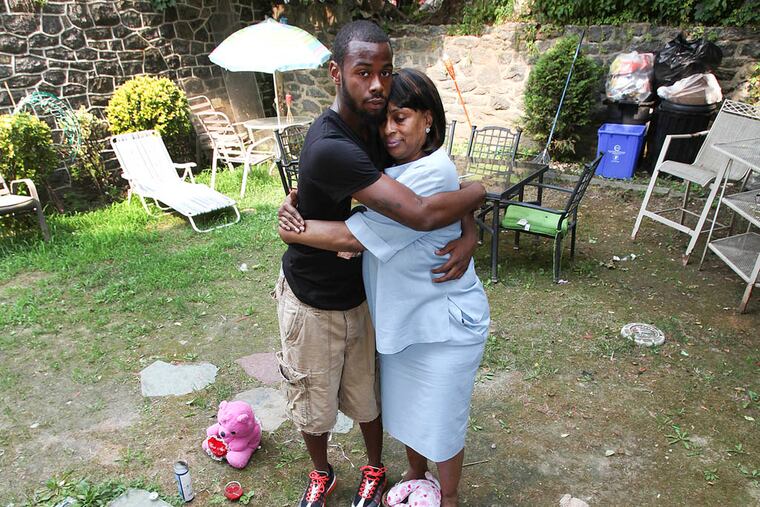Case of teen slain over nothing goes to jury
Defense attorneys blame victims murdered brother.

"GET BUSY."
Those are the words Aaron Rogers told the Daily News that he heard in 2013 right before two men killed his 17-year-old brother, Tremaine, and those are the words that jurors have repeatedly heard over the course of four days of testimony in the trial of Robert Anderson, 29, and Tyreek Hall, 27, the men who are accused of Tremaine's slaying.
But Aaron never got a chance to get up on the stand during trial and tell the jurors those words or what he witnessed that day because two months before his brother's murder trial, Aaron's life was claimed by gunfire at 65th Street near Lansdowne Avenue in Overbrook, just a block away from where Tremaine lost his life.
Aaron's slaying remains unsolved, and the defense attorneys for the men charged with his brother's killing have mounted self-defense cases for their clients over the past week by claiming that Aaron pulled out a gun first, forcing one of them to fire.
"He has a large responsibility for his brother's death," Jack McMahon, Anderson's lawyer, said in his closing yesterday.
Assistant District Attorney John O'Neil said the mountain of evidence against Hall and Anderson placed them at the scene and placed Hall as the shooter, so the only defense the men could mount was self-defense.
"It was the last option, it was the only option, and when you look at all the evidence in this case, it was a ridiculous option," O'Neil said.
According to court testimony, on July 13, 2013, two of the Rogers brothers' young friends got into a fight with two other neighborhood boys. While the brothers and their two friends were playing basketball in the driveway later that day, Hall and Anderson, who knew the boys with whom the brothers' friends had fought, pulled up in a rented Mustang.
Both men claim they went to talk with the boys to "squash the situation." In his testimony on the stand, Hall said the group had a "respectful conversation" but when Anderson went to leave, Aaron pulled a gun from his waistband so Hall pulled out his illegally purchased gun and fired seven times "for my safety."
One of those bullets went into Tremaine's back and killed him.
According to evidence and testimony presented by O'Neil, Aaron did not have a gun that day and one has never been seen or found.
O'Neil said that while talking to the Rogers brothers and their friends, Hall and Anderson became upset when the boys started "talking too reckless" and not showing them respect.
That's when Anderson allegedly told Hall to "get busy" and the shooting began.
Both McMahon and Richard Giuliani, Hall's defense lawyer, urged the jury in their closing arguments not to get overwhelmed by the emotion of an innocent life being lost.
"It's maddening, it's infuriating, it's horrible. . . . Tremaine Rogers should not have died. He did nothing wrong," Giuliani said. "The thing I fear most of all is that you go back there and get overwhelmed by emotion."
In his closing, McMahon told jurors that their decision in this case may be the most important one they ever make.
"You better get it right today because if you're wrong, it will live forever," he said.
In his closing argument, O'Neil said the shooting stemmed from Anderson and Hall's belief that they did not get the respect they felt they deserved.
"Nobody thinks if you fire seven shots into a group of kids that things are going to be OK for those kids," O'Neil said. "Tremaine Rogers is dead because these two showed up and didn't like what they heard."
The case was sent to the jury late yesterday afternoon.